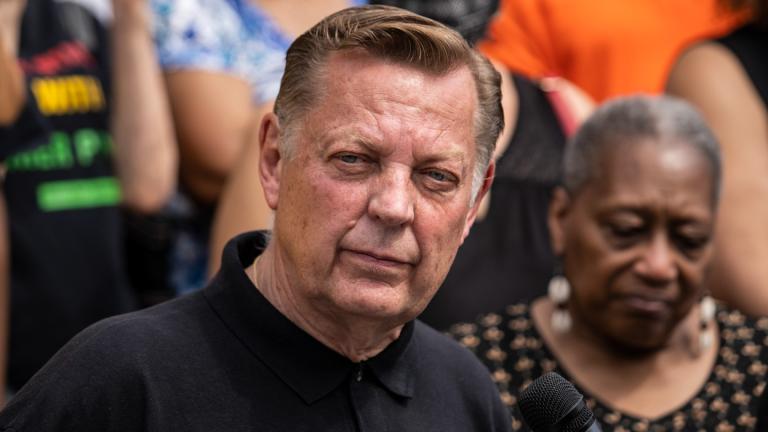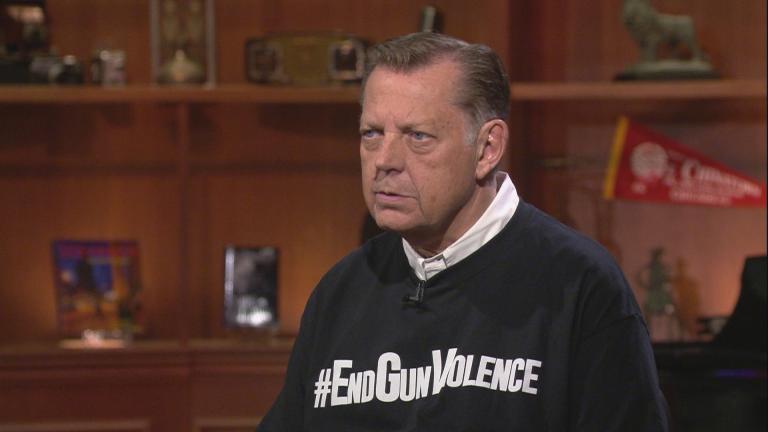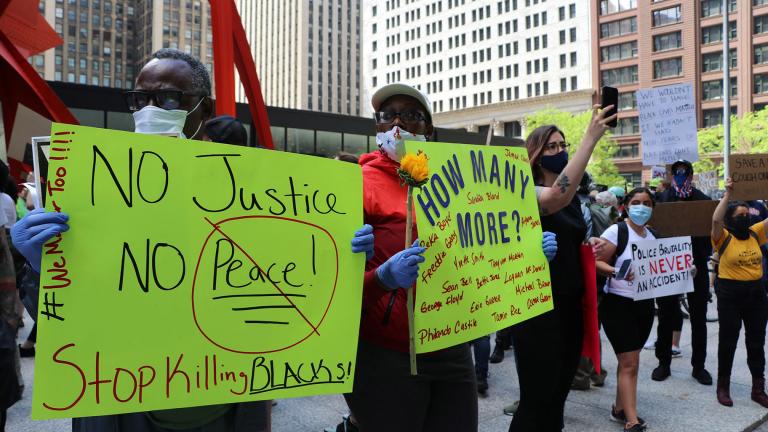Archbishop Blase Cupich talks about his surprise appointment by Pope Francis, how he intends to reverse the decline in Catholics attending mass, and what the church is doing to rebuild trust broken by priest sexual abuse scandals. We'll also ask him what he has been hearing from local Catholics since his arrival in Chicago.
Learn more about Cupich’s position on key issues in his own words.
Immigration
Immigration was an underlying theme of Cupich’s installation homily.
“When it came to selecting a date for the installation, November 18 seemed to be a great fit. The Commemoration of the Dedication of the Basilicas of Saints Peter and Paul gives me a chance to recognize all immigrants, as I recall my own immigrant grandparents who helped establish my home parish of Saints Peter and Paul in Omaha. Additionally, the Church’s calendar today celebrates St. Philippine Duchesne, someone the Native People honored with the name Woman Who Prays Always. She reminds us of the extraordinary contribution women religious have made and continue to make to the church and society. I intend to honor and give thanks for all these people today, especially for family and immigrants, Native Americans and religious sisters – all of whom have shaped so much of our faith, our lives and our Church ministries.”
In an interview last month with Commonweal, Cupich addressed the plight of immigrants. While Cupich acknowledged the fear some people have regarding terrorism and the security of national borders, he said a lot of people have forgotten that these immigrants have been invited into the country.
“I lived in eastern Washington the past four years, and I can tell you the growers would not be able to continue their business without people who come here—even without documentation—to pick the vegetables and the fruit. We’re not talking about people who just want to come in and violate our laws. We have invited them by creating this market for employment, and we have to own that. So how do you address all those concerns, including the aspirations of people, which God has given to them, to better their family life?
The other part of the problem is that some immigrants have experienced violence in their countries. And why? Because of gangs. And why gangs? Because of drugs. Who’s giving them the money for the drugs and the guns? We are. I’m really surprised that religious and civil leaders have not spoken more strongly to condemn recreational drug users who are in fact funding the violence that people who come to this country are trying to escape. That’s a story that has not been told. We have a responsibility to raise our voices about that.”
Sexual Abuse by Priests
Later during his installation homily, Cupich addressed sexual abuse of children by priests.
“The authenticity that comes in making our own baptismal calling the starting point for all we do is also demanded of me as your archbishop, particularly as I reach out to those who have been sexually abused by Church leaders. That starting point will always be needed for me and my brother bishops to keep fresh the serious duty to honor and keep the promises we made in 2002. Working together to protect children, to bring healing to victim survivors and to rebuild the trust that has been shattered in our communities by our mishandling is our sacred duty, as is holding each other accountable, for that is what we pledge to do.”
During a September 2010 interview with Inlander, Cupich, who was then Bishop of Spokane, said the reported sexual abuses no longer occurred.
“Sexual abuse of children is not happening in the church today. These are historical cases. The last time that we have a case of actual abuse of a child [in Spokane] is in the early ’80s. This is not anything that is happening now.
The scandal is that, 30 years ago, the world of psychology, criminal law and the church didn’t handle the situation well. Society didn’t handle the situation well.
Today, even, we have various institutions that work with kids that don’t have in place codes of conduct and training that we have in place. We would hope that the measures we are taking can be instructive to these other institutions.”
Abortion
After his installment last November, Cupich said he would not withhold communion to those who supported abortion rights during an interview with Face the Nation.
"I would not use the Eucharist, or as they call it 'the communion rail,' as a place to have those discussions or a way in which people would be either excluded from the life of the church. The Eucharist is an opportunity of grace and conversion. It's also a time of forgiveness of sins, so my hope would be that grace would be instrumental in bringing people to the truth."
Same-Sex Marriage
When same-sex marriage was being voted on in Washington in 2012, Cupich instructed Catholics to vote against the referendum. According to Crux, a letter by Cupich which was to be read at masses, said:
"[To praise those who are], 'motivated by compassion for those who have shown courage in refusing to live in the fear of being rejected for their sexual orientation.’”
During an interview with Face the Nation, following his installation, Cupich said it was important for people who opposed same-sex marriage not to provoke violence.
“I think in Washington state where I was bishop for the past four years, there was a referendum on this very issue and I spoke very clearly about this; I said first of all we cannot use this moment of public debate to say anything or do anything that would provoke violence against gay and lesbian people. We have to make sure we’re not part of that and we would condemn that. At the same time, it’s not just about gay marriage it’s about whether or not we’re going to have statutes in our state that uphold and protect people who take the risk of bringing children into the world, people who as mothers and fathers coming together in their love continue the human race.”
In a Chicago Magazine interview, Cupich expanded the discussion about how the church views same-sex marriages to include how the church views divorced or remarried people.
“Are we going to start doing same-sex marriages in church? No. I think that anybody who believes that is not in touch with reality. I do think that at the Synod of Bishops in October there was an openness to try to better understand the life of a person who has same-sex attraction. I think there is also consensus that the church needs to reach out to divorced and remarried people and see how they can be integrated into the life of the church. But we’re not talking about changing doctrine.
If we are talking about the doctrinal issue, I would say that it’s maybe recovering aspects of our doctrine that need to be held up again, looked at again, for us to get a fuller picture of church teachings. When we say, “We want to hold to doctrine,” let’s make sure we have the full breadth of that doctrine, the full breadth of what we teach.”
Changing Outlook
In his installation homily, Cupich alluded to the church needing to step out of its comfort zone and be more inviting.
“Jesus invites us, not only to take the risk of leaving our comfort zone, but also to deal with the tension involved in change, not dismissively but in a creative way, and to challenge each other to do so. Maybe, we hear that challenge today as a call to leave behind our comforting convictions that episodic Sunday Mass attendance is good enough, that we don’t really have to change our habitual bad behavior, our unhealthy dependencies, our inordinate attachments, because we can get by as we are, because they have not gotten us into any serious trouble yet, or just because we are afraid of the unknown.
Pope Francis is giving voice to this invitation in our day, by inviting the Church to come and walk with Christ, as he is always doing something new. It is an invitation to leave behind the comfort of going the familiar way. He is challenging us to recognize that Christ is always inviting us to more, to greater things. It is the kind of invitation our bishops’ conference is making to our nation to be what it has always promised to be, to protect the vulnerable, poor and weak, to treat immigrants with justice and dignity, to respect life and to be good stewards of creation. It is the invitation of Jesus, “Come, take the risk of being more.”’
View his career timeline.







